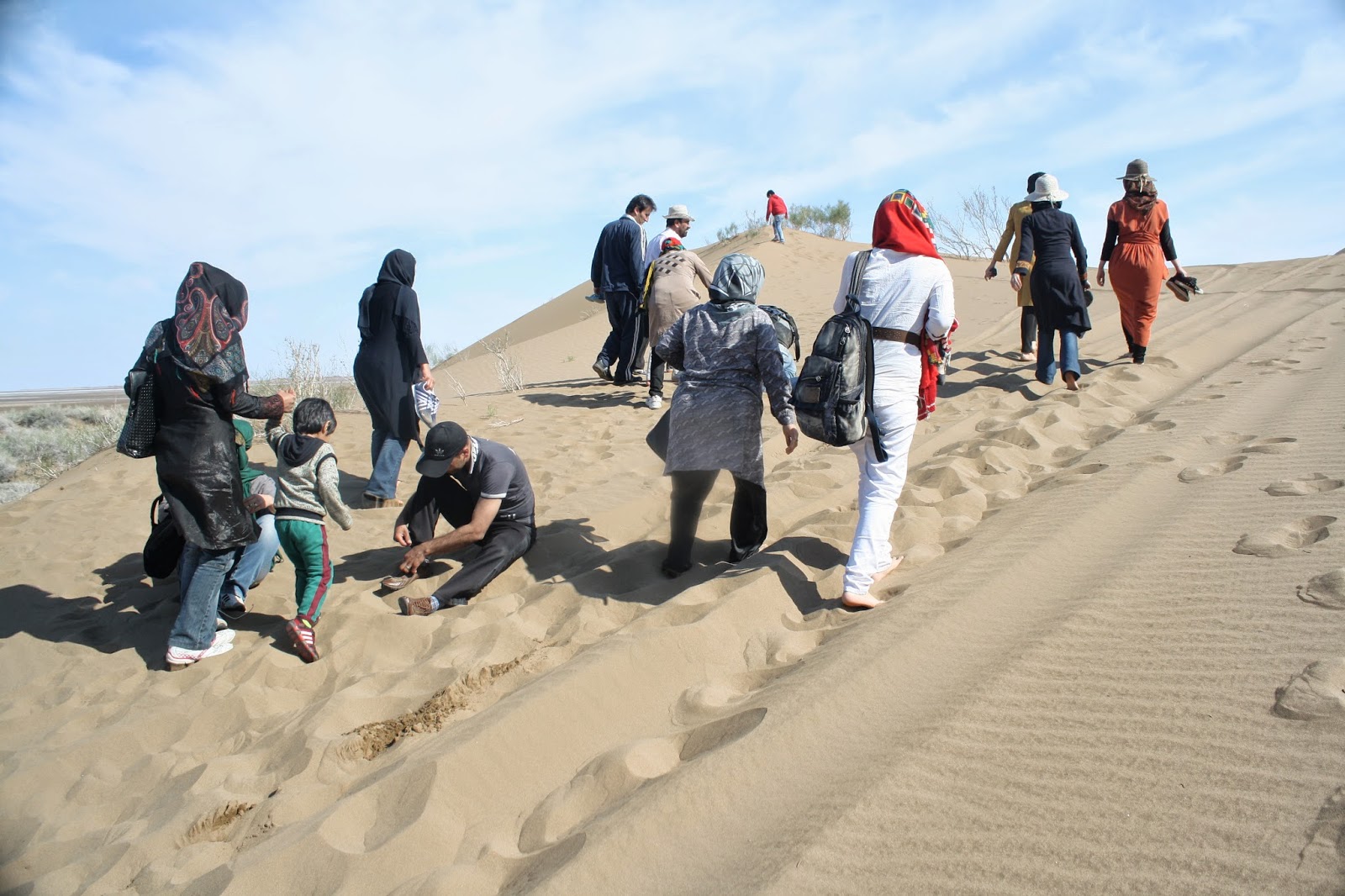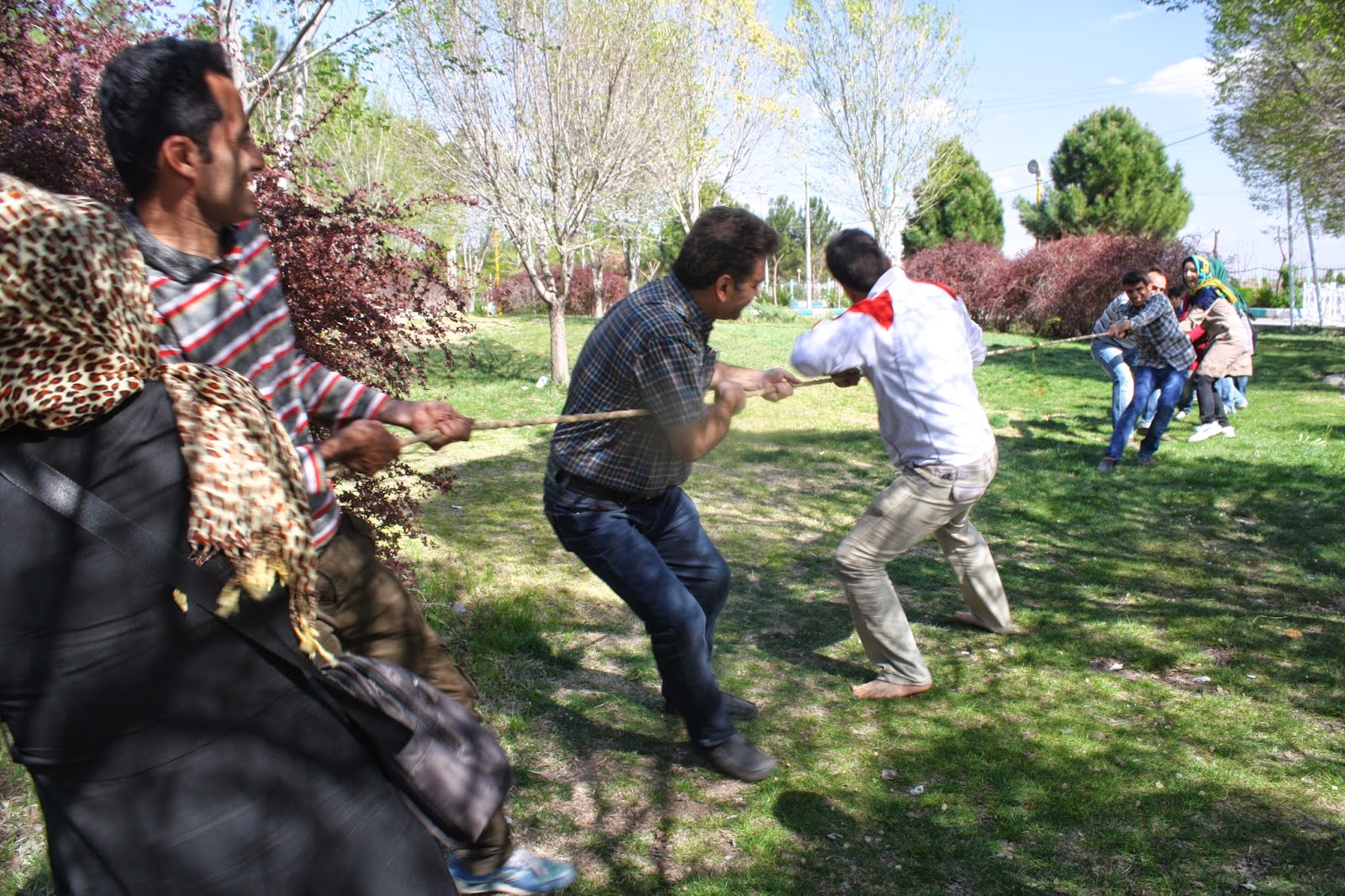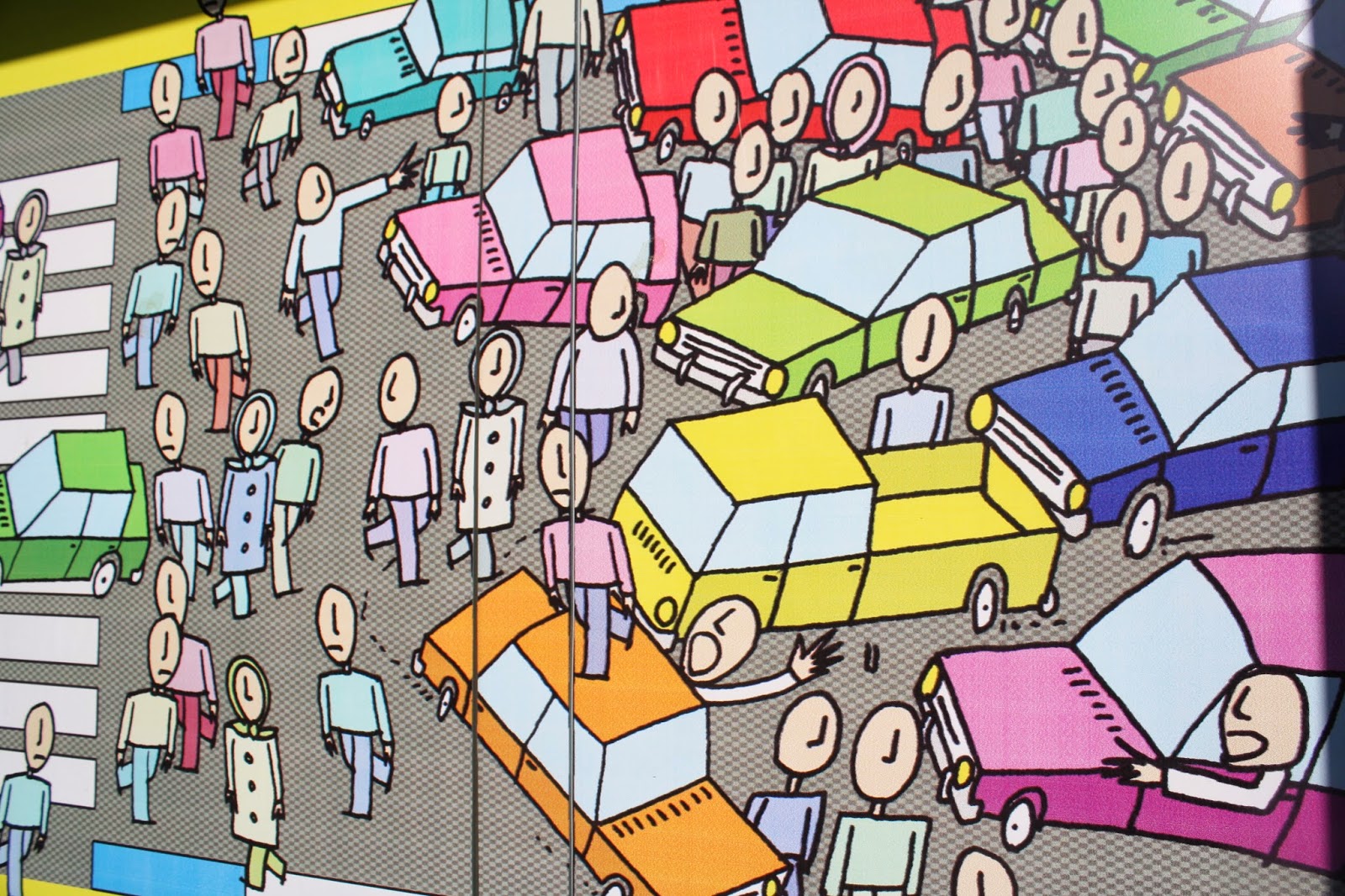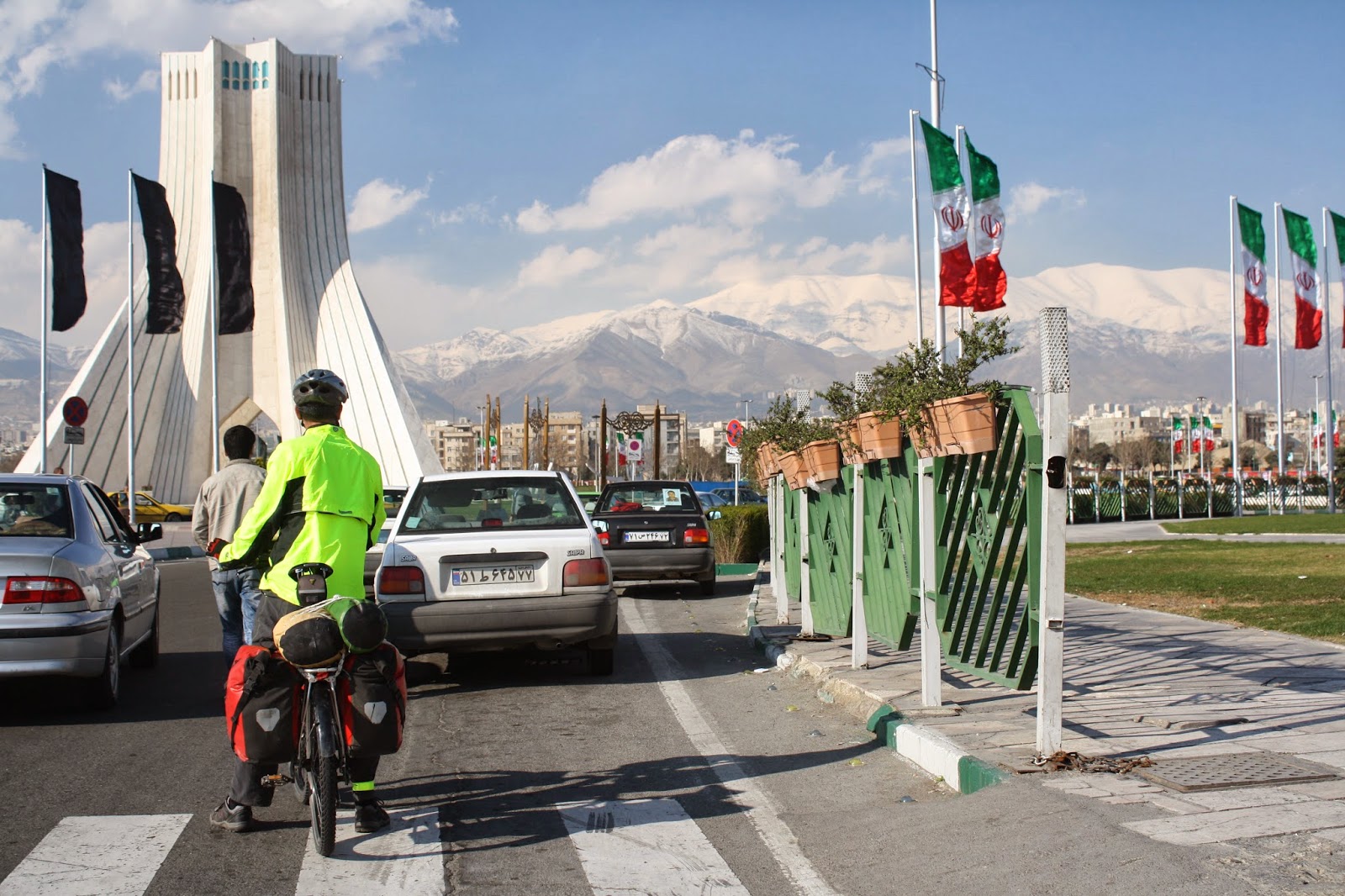We are being led to the bus station by Amir and Samaneh in their car. Amir lets the car slow so that Samaneh can snap us on our bikes with her phone. He leans over and shouts out "Which country? Which country?" This is a scene familiar to anyone who cycle tours through Iran. There's a bus about to leave when we turn up. Amir sorts us out, bikes are thrown into the baggage compartment, quick farewells and we jump aboard. There are spare seats separated by the aisle. I sit next to a very quiet man. Gayle sits next to a smiley young woman in a chador. After about half an hour along the road, the woman moves Gayle's hand, takes it in hers, and lays out on her knees to snooze in such an affectionate way that Gayle can only laugh and carry on reading her book.
In Esfahan we load up the bikes and cycle through the city centre to reach Ahmad's out in the suburbs. It's early afternoon when we arrive. We have the phone number for our Warm Showers host so I ask in a small shop if I could call him. They very kindly agree and within minutes we are wheeling our bikes into Ahmad's entrance hall. He quickly shows us where to put our bags in the bedroom and suggests we go and visit the city. He apologises but says he has to go out and won't be back until 8 or 9 in the evening. So, after a shower and a cup of tea we think about heading back into the city. However, i still need a bit of trombone practice and my tooth is still giving me gyp. So we opt for a siesta until about 6.
An hour later Ahmad returns. He seems a bit cold to us, and not very talkative. We wonder if he's just hosted too many guests. After an initial couple of questions about our journey he isn't interested. He asks if we've had dinner. Neither of us are particularly hungry, but Ahmad isn't offering in any case. But we decide to go back to the corner shop for some fruit and yoghurt. On the way back we go and sit in the nearby park and enjoy the cool evening air. When we get back, Ahmad is sat outside his back door, looking at a couple of big house plants in pots that he's dragged outside. He's chatty now and seems a bit happier. He asks us about how we manage to travel for such a long time, tells us he's no longer a Muslim, tells us that he has hosted over a hundred Couch Surfers until he had a problem with the police and they told him to stop hosting. He also had to delete his Couch Surfing account. There are a few testimonials and thank you notes from some of these surfers stuck on his bedroom wall. Oddly, these are addressed to Arman and Arad and some have had the greeting snipped off.
After a chatty evening we all retire early, professing tiredness. Ahmad offers us his bed and he takes blankets into the lounge. An hour later we are all still wide awake. Ahmad is in the shower - we can hear it. We are discussing what to do about the $200 missing from my money belt. I had noticed that my money belt was out of place in my bar bag. When I looked inside everything was back to front. The $200 I had got out to change in Esfahan were still showing, but when I counted up the balance, tucked into a plastic sleeve, there were notes missing. Ahmad had obviously been a bit naughty. We had been unmistakably stupid - having left our cash in our barbags when we went out to the shops. We decide to say nothing until the morning - unsure whether it might get nasty and unsure how to attempt to recover the cash. Meanwhile some friends turn up....
It's obvious to us now, stung, that Ahmad/Arman/Arad is a repeat offender and why he no longer has a Couch Surfing account. We had assumed it was something to do with over-sensitive authorities - not thieving. In the morning we opt to pack up, load the bikes, and ask for our money back. Our only leverage is to threaten to go to the police. This would be a bluff - we have no intention of giving the police a chance to ask us questions about Warm Showers and our previous hosts. Surprisingly, the bluff works.
Ahmad looks surprised when we load up our bikes - maybe he thought he would be undetected. We tell him we need the money, and that if it is returned we will not go to the tourist police. He looks disturbed. I try to take a photo for old times' sake. He cracks. He tells us that a friend came round while we were out. He is now asleep in the lounge. Ahmad goes inside and reappears with the cash - telling us it was in his friend's wallet. He can barely look us in the eye. We tell him we will have to give him a negative reference on the Warm Showers website. (Within a day of doing this, his profile is deleted, presumably by him. We also report the incident to the website but we suspect he will re-register with another name - maybe Ali Reza this time.)
We ride off, relieved to have recovered the cash, relieved he didn't find Gayle's stash, relieved that there was no violence. He really looked pathetic and pitiful when we said goodbye. No doubt we weren't the first or the last suckers to drop our guard. It's been a good lesson for us.
In Esfahan we load up the bikes and cycle through the city centre to reach Ahmad's out in the suburbs. It's early afternoon when we arrive. We have the phone number for our Warm Showers host so I ask in a small shop if I could call him. They very kindly agree and within minutes we are wheeling our bikes into Ahmad's entrance hall. He quickly shows us where to put our bags in the bedroom and suggests we go and visit the city. He apologises but says he has to go out and won't be back until 8 or 9 in the evening. So, after a shower and a cup of tea we think about heading back into the city. However, i still need a bit of trombone practice and my tooth is still giving me gyp. So we opt for a siesta until about 6.
An hour later Ahmad returns. He seems a bit cold to us, and not very talkative. We wonder if he's just hosted too many guests. After an initial couple of questions about our journey he isn't interested. He asks if we've had dinner. Neither of us are particularly hungry, but Ahmad isn't offering in any case. But we decide to go back to the corner shop for some fruit and yoghurt. On the way back we go and sit in the nearby park and enjoy the cool evening air. When we get back, Ahmad is sat outside his back door, looking at a couple of big house plants in pots that he's dragged outside. He's chatty now and seems a bit happier. He asks us about how we manage to travel for such a long time, tells us he's no longer a Muslim, tells us that he has hosted over a hundred Couch Surfers until he had a problem with the police and they told him to stop hosting. He also had to delete his Couch Surfing account. There are a few testimonials and thank you notes from some of these surfers stuck on his bedroom wall. Oddly, these are addressed to Arman and Arad and some have had the greeting snipped off.
After a chatty evening we all retire early, professing tiredness. Ahmad offers us his bed and he takes blankets into the lounge. An hour later we are all still wide awake. Ahmad is in the shower - we can hear it. We are discussing what to do about the $200 missing from my money belt. I had noticed that my money belt was out of place in my bar bag. When I looked inside everything was back to front. The $200 I had got out to change in Esfahan were still showing, but when I counted up the balance, tucked into a plastic sleeve, there were notes missing. Ahmad had obviously been a bit naughty. We had been unmistakably stupid - having left our cash in our barbags when we went out to the shops. We decide to say nothing until the morning - unsure whether it might get nasty and unsure how to attempt to recover the cash. Meanwhile some friends turn up....
It's obvious to us now, stung, that Ahmad/Arman/Arad is a repeat offender and why he no longer has a Couch Surfing account. We had assumed it was something to do with over-sensitive authorities - not thieving. In the morning we opt to pack up, load the bikes, and ask for our money back. Our only leverage is to threaten to go to the police. This would be a bluff - we have no intention of giving the police a chance to ask us questions about Warm Showers and our previous hosts. Surprisingly, the bluff works.
Ahmad looks surprised when we load up our bikes - maybe he thought he would be undetected. We tell him we need the money, and that if it is returned we will not go to the tourist police. He looks disturbed. I try to take a photo for old times' sake. He cracks. He tells us that a friend came round while we were out. He is now asleep in the lounge. Ahmad goes inside and reappears with the cash - telling us it was in his friend's wallet. He can barely look us in the eye. We tell him we will have to give him a negative reference on the Warm Showers website. (Within a day of doing this, his profile is deleted, presumably by him. We also report the incident to the website but we suspect he will re-register with another name - maybe Ali Reza this time.)
We ride off, relieved to have recovered the cash, relieved he didn't find Gayle's stash, relieved that there was no violence. He really looked pathetic and pitiful when we said goodbye. No doubt we weren't the first or the last suckers to drop our guard. It's been a good lesson for us.
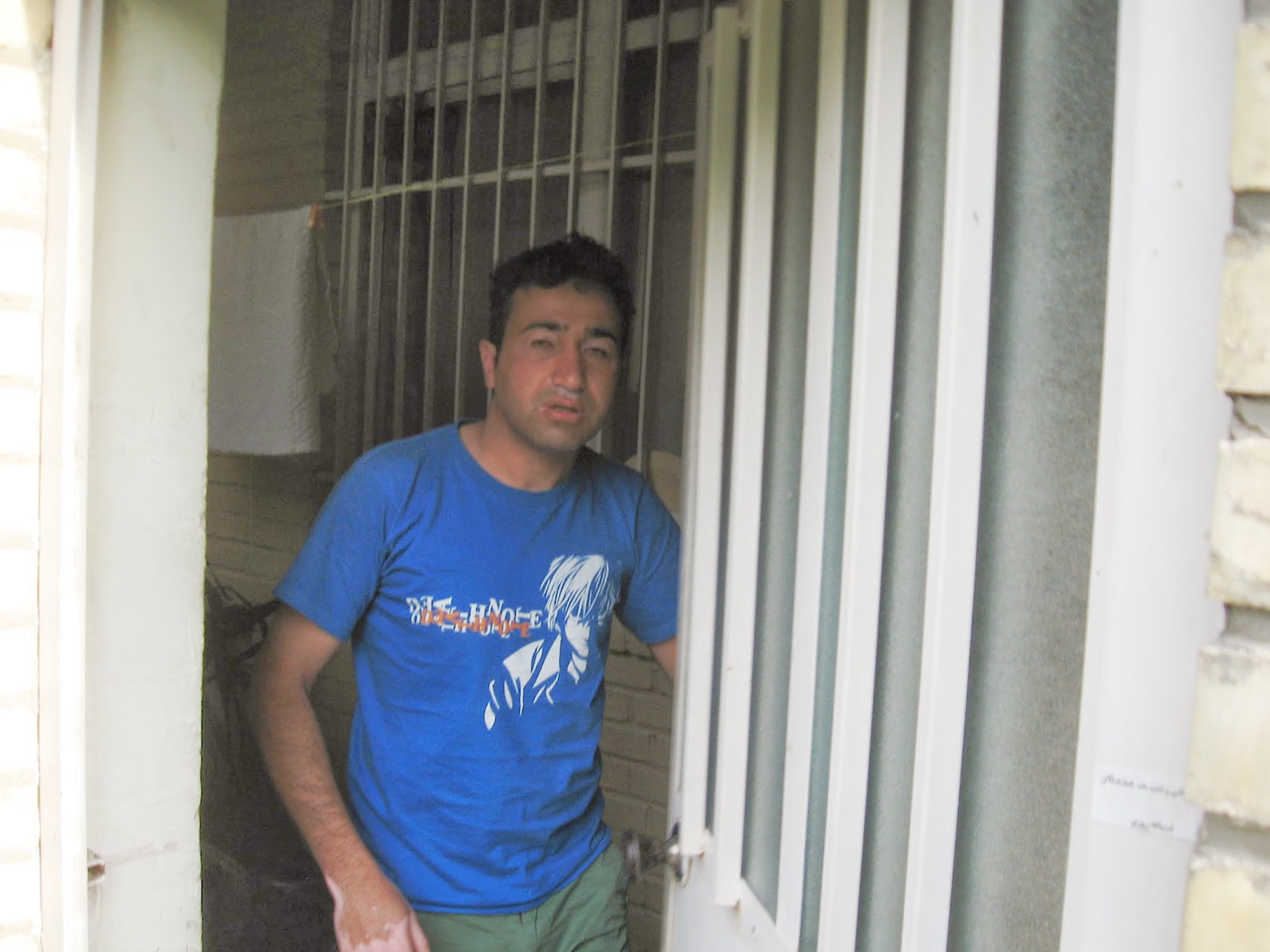 |
| Ahmad / Arman / Arad |


